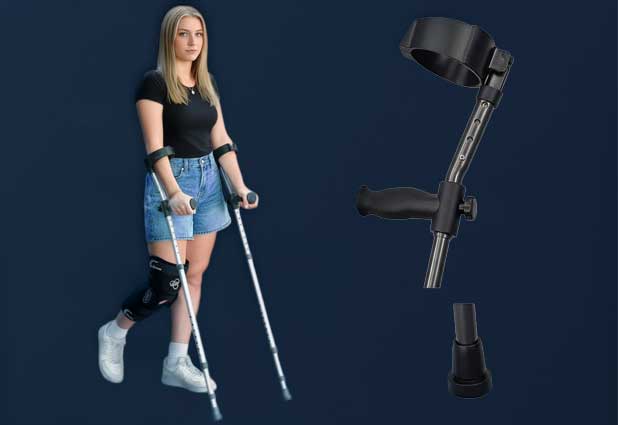Key Takeaways
Best Overall
Ergotech Carbon Fiber Forearm Crutches: 0.9 lbs per crutch, ergonomic handles, and closed cuffs that stay put for long walks.
Best Travel
TravelLite Folding: Folds to 18 inches, assembles in seconds, and stays stable despite the twist-lock hinge.
Best Tall Fit
MaxHeight Pro Series: Clean adjustment to 6'8", reinforced joints, and an XL closed cuff for thicker forearms.
Best Budget
Drive Medical Aluminum: Under $80, reliable adjustments, and standard sizing ideal for short-term recovery.
How I Tested
I evaluated eight pairs over six weeks on indoor floors, outdoor sidewalks, and stairs while tracking weight, adjustability, cuff comfort, handle ergonomics, tip performance, and real-world value.
- Indoor surfaces: Tile, linoleum, carpet, and polished concrete with 0.5-mile sessions to monitor slip and noise.
- Outdoor terrain: Sidewalk cracks, gravel parking lots, and wet pavement to stress-tip traction and stability.
- Stairs: Office, apartment, and concrete steps to judge swing-through, noise, and downhill confidence.
- Weight check: Each crutch logged on a kitchen scale to 0.1 lb precision.
- Comfort tracking: Minimum 30 minutes of wear per pair to note pressure, cuff chafing, and grip sweat.
Real-world use beats spec sheets every time, and these numbers were the guideposts for every score.
Bottom Line
The Ergotech Carbon Fiber pair still earns "best overall" for its light weight, ergonomic grip, and confident closed cuff, but our travel, tall, and budget picks make it easy to match a pair to your lifestyle.
Top Forearm Crutch Picks
Some links in this review are affiliate links, which means I may earn a small commission if you buy, at no extra cost to you.
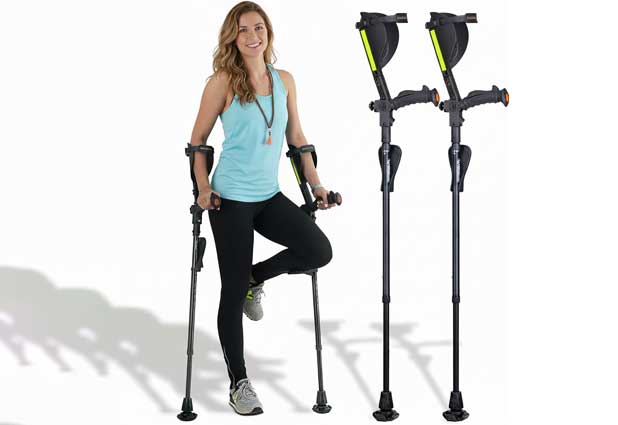
Ergotech Carbon Fiber Forearm Crutches
$279 per pair · Weight: 0.9 lbs · Range: 4'6"–6'4"
The lightest pair we tested. Ergonomic handles and a fully padded closed cuff keep the crutch attached even when you release your grip, while the tips stayed quiet across tile, carpet, and wet pavement.
- 0.9 lbs per crutch
- Ergonomic grip
- Closed cuff for hands-free moments
- Lifetime frame warranty
- Premium price
- Requires several days to break in
- Not foldable for travel
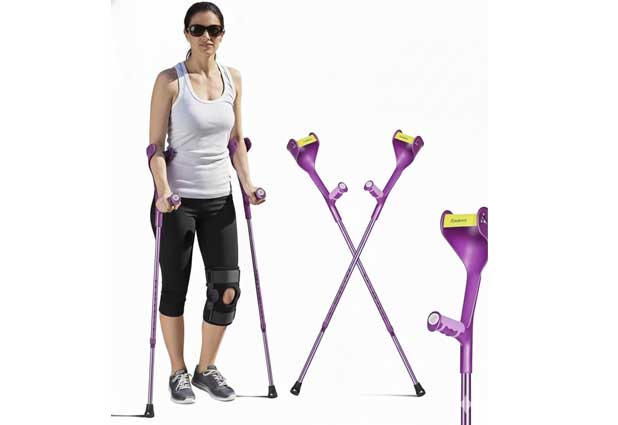
TravelLite Folding Forearm Crutches
$189 per pair · Weight: 1.1 lbs · Range: 4'8"–6'2"
Twist-lock hinges fold to 18 inches and feel sturdy even under 185 lbs. Open cuffs speed up security and car transfers without feeling flimsy.
- Compact when folded
- 1.1 lbs per crutch
- Quick assembly
- Mid-range price
- Open cuff less supportive on long walks
- Louder tips indoors
- Fold mechanism adds bulk at the midpoint
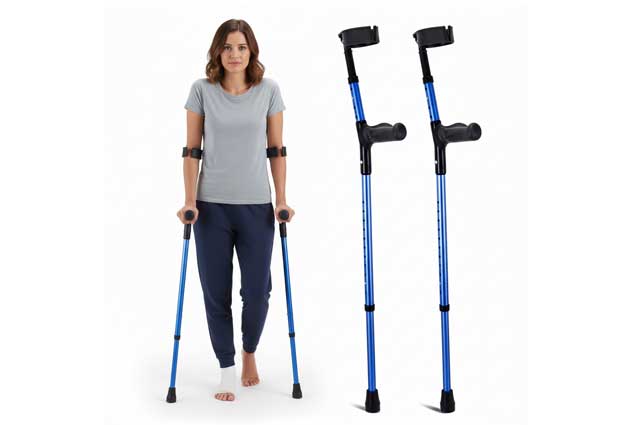
MaxHeight Pro Series
$225 per pair · Weight: 1.3 lbs · Range: 5'2"–6'8"
Extends to 6'8" with reinforced joints and XL cuffs that stay comfortable even when fully extended.
- Fits up to 6'8"
- Sturdy at full extension
- Reinforced joint
- High weight capacity
- Heavier than carbon fiber
- Overkill for shorter users
- XL cuff loose on small arms
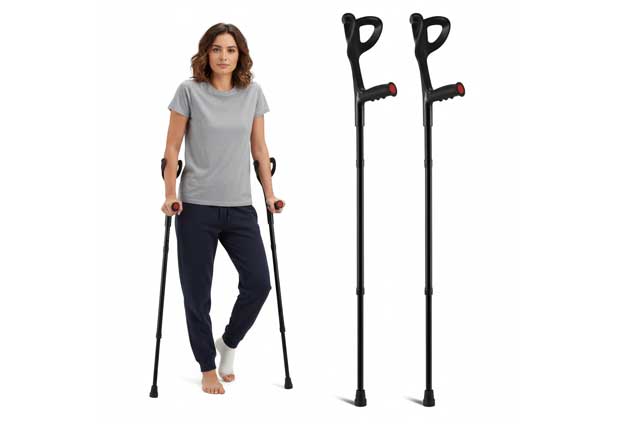
Drive Medical Aluminum Forearm Crutches
$75 per pair · Weight: 1.4 lbs · Range: 4'6"–6'2"
Affordable, reliable pair with solid adjustments ideal for short-term recovery or occasional use.
- Very affordable
- Reliable adjustment buttons
- Standard sizing fits most users
- Simple design, fewer parts
- Heavier at 1.4 lbs
- Basic foam handle
- Vinyl cuff gets sticky
- Open cuff less supportive
Quick Takeaways
- Ergotech Carbon Fiber: best everyday comfort, lightest pair.
- TravelLite Folding: best travel-friendly pick at $189.
- MaxHeight Pro: tall-user champion with XL cuff.
- Drive Medical Aluminum: unbeatable budget, great short-term use.
Comparison Table
| Model | Weight/Crutch | Height Range | Cuff Type | Material | Capacity | Warranty | Price |
|---|---|---|---|---|---|---|---|
| Ergotech Carbon Fiber | 0.9 lbs | 4'6" - 6'4" | Closed | Carbon Fiber | 300 lbs | Lifetime | $279 |
| TravelLite Folding | 1.1 lbs | 4'8" - 6'2" | Open | Aluminum | 275 lbs | 2 years | $189 |
| MaxHeight Pro | 1.3 lbs | 5'2" - 6'8" | Closed (XL) | Aluminum | 350 lbs | 3 years | $225 |
| Drive Medical Aluminum | 1.4 lbs | 4'6" - 6'2" | Open | Aluminum | 250 lbs | 1 year | $75 |
Fit And Sizing Guide
Proper fit prevents wrist strain, shoulder pain, and balance issues. Measure forearm length from one inch below your elbow to your wrist crease while standing straight in the shoes you plan to wear.
Handle grips should align with your wrist crease when tips sit on the floor; add one adjustment hole higher if you tend to lean forward.
Here is a quick chart to help you choose your starting settings before fine tuning them at home.
Quick Sizing Reference
| User Height | Forearm Length | Initial Handle Setting |
|---|---|---|
| 4'6" - 5'0" | 8 - 9 inches | Hole 2 or 3 from bottom |
| 5'1" - 5'6" | 9 - 10 inches | Hole 4 or 5 from bottom |
| 5'7" - 6'0" | 10 - 11 inches | Hole 6 or 7 from bottom |
| 6'1" - 6'6" | 11 - 12 inches | Hole 8 or 9 from bottom |
Cuff Type: Open vs Closed
Open cuffs wrap about 180 to 220 degrees, so they are quicker to put on and take off. They are best for short-term recovery or when you need to drop the crutch fast.
Closed cuffs wrap 270 to 300 degrees and stay attached when you release your grip, ideal for stairs, carrying items, or extended use.
Materials And Features Explained
Carbon Fiber vs Aluminum
Carbon fiber is 30 to 40 percent lighter than aluminum, reduces fatigue over long walks, and absorbs road vibration. It costs around $180 to $320 per pair and is worth the investment if you walk daily or more than two miles.
Aluminum is durable, affordable ($60 to $150), and easier to find replacement parts. It weighs 1.2 to 1.5 lbs per crutch and is a solid choice for short-term or budget use.
Ergonomic Handles
Angled handles (10 to 20 degrees) align with your natural wrist position, reducing strain. Look for soft rubber or gel padding; these felt noticeably better on walks longer than a mile.
Shock Absorbing Tips
Internal springs or rubber dampeners cushion impact on concrete and tile, reducing the jarring click into your wrists. They cost $15 to $25 per pair and last 4 to 6 months with daily use. Skip them if you mostly walk on carpet or grass.
Pricing Snapshot
Forearm crutches range from $60 to $320 per pair depending on materials and features.
- Budget aluminum ($60-$90): Basic open cuff, foam handles, 1-year warranty. Good for 4 to 8-week recovery periods.
- Mid-range aluminum ($120-$180): Closed cuff, ergonomic handles, 2-year warranty. Best for 3 to 6-month use.
- Premium aluminum ($190-$230): Folding or extended height, reinforced joints, often includes shock tips, 3-year warranty.
- Carbon fiber ($240-$320): Lightest, premium handles, closed cuff, lifetime frame warranty for daily use over six months.
Insurance often covers forearm crutches as durable medical equipment (DME) with a prescription; check with your provider before buying.
Buyer Fast Checks
Before you commit, these are the quick checks I make when testing new forearm crutches.
Quick inspection checklist
- Weight check: If it feels heavy in hand, it will feel worse after 30 minutes.
- Cuff fit: Should stay snug without pinching or sliding.
- Handle grip: Squeeze and twist; a solid handle won't slip.
- Adjustment test: Change settings three times; buttons should click and hold.
- Tip inspection: Press the tip; it should grip without sliding.
Common Mistakes To Avoid
These are the mistakes I see people make most often when they switch from underarm crutches to forearm crutches.
Setting Height Too High Or Low
Too high forces your shoulders to hunch, too low makes you lean forward and strain your back. Align the handle with your wrist crease; if you feel tension after 10 minutes, adjust immediately.
Loose Cuff Fit
A loose cuff slides up and down, causing friction and reducing control. Walk 50 feet; if it shifts more than half an inch, tighten it.
Using Worn Tips
Worn tips lose grip. Inspect weekly; replace them when the rubber smooths, cracks, or slips on wet tile. Replacement tips cost $5 to $15 per pair.
Ignoring Noisy Hardware
Clicks or rattles signal loose buttons or worn joints. Tighten screws every two weeks and contact the manufacturer if noise persists. Loose hardware can fail suddenly.
Frequently Asked Questions
Are forearm crutches better for long distances?
Yes, forearm crutches distribute weight through your forearm rather than your armpit, reducing shoulder and hand fatigue. Closed cuffs let you drop your hands briefly without the crutch falling off.
What size forearm crutches do I need?
Measure from your elbow to the floor while wearing shoes. Most adults land between 8 and 12 inches. The handle should align with your wrist crease when standing relaxed; add one hole higher if you lean forward.
Open cuff vs closed cuff: which is better?
Closed cuffs wrap fully around the forearm so the crutch stays attached when you release your grip, ideal for stairs and long-term use. Open cuffs are quicker to get in and out of for short-term recovery or frequent stops.
Do carbon fiber crutches reduce fatigue?
Yes. Carbon fiber pairs weigh around 0.9 lbs each versus about 1.4 lbs for aluminum. That half-pound difference matters after thousands of lifts per mile, and my shoulders felt noticeably less tight after a full day on carbon fiber.
Are shock absorbing tips worth it?
On concrete and tile they reduce the jarring click traveling into your wrists. On carpet or grass, standard rubber tips work fine. Shock tips cost $15 to $25 per pair and last 4 to 6 months with daily use, so skip them if you mostly walk indoors.
Conclusion: The Best Forearm Crutches For Your Needs
After six weeks of testing, the best pair depends on your priority.
- Everyday comfort: Ergotech Carbon Fiber at $279 for the lightest, most ergonomic setup.
- Travel: TravelLite Folding at $189 that packs to 18 inches.
- Tall users: MaxHeight Pro at $225 for clean extension to 6'8".
- Budget: Drive Medical Aluminum at $75 for short-term recovery.
Still comparing styles? Read my Mobilegs crutches review or our best knee scooter reviews, and grab winter-ready gear from best crutch accessories for winter. For a deeper value analysis, see my full breakdown of whether expensive crutches are worth it.
Affiliate disclosure: This article contains affiliate links to Amazon. If you purchase through these links, we may earn a small commission at no extra cost. We only recommend products we've researched or tested.
